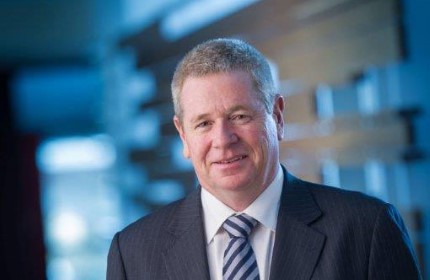Shared Value Champions

Shared Value Champions

Mike Hirst, Managing Director, Bendigo and Adelaide Bank
Following Bendigo and Adelaide Bank’s recent achievements, including its recognition as the corporate organisation leading through shared value at the 2017 Shared Value Awards, Mike Hirst, Managing Director Bendigo and Adelaide Bank, speaks to In Practice, the Shared Value Project’s monthly journal as part of their member interview series.
What does shared value mean to you?
For me, shared value reflects one of the key motivations for our company – feeding into the prosperity of the community rather than off it. In doing that, we believe that all the stakeholders in our business – customers, partners, suppliers, shareholders and the community – should receive a fair return for the effort they put in. That doesn’t mean they all receive the same return, but they should be able to participate in the value they help create, at a fair rate of return.
Underpinning and strengthening local communities is a corollary of the above and is implied in our corporate strategy. That effort is not entirely selfless, as I believe that there is a profound connection between business success and community wellbeing, and that for a business to prosper, the community it serves must also prosper.
For many leaders in business, corporate responsibility is about the philanthropic role a business can play by improving environmental and social outcomes or minimising social or environmental harm through risk management - but we see Shared Value as something bigger than that.
What led you individually to the shared value idea? How did you come across it?
My introduction to shared value began with me joining Bendigo bank in 2001. Bendigo had been ‘sharing value’ since its foundation almost 160 years ago when it began life as a co-operative building society on the goldfields of Bendigo in Victoria. As Bendigo grew and developed, people needed to co-operate and collaborate in order to establish a facility that could hold their savings and add value to the district by lending for housing and other vital civic infrastructure. This was in an era when people were progressing from living in tents to building houses, establishing businesses and building what became a thriving local economy.
In the last century, Bendigo’s shared value journey began with the establishment of the Community Bank® concept which was developed as community angst grew as Australia’s major banks reduced their branch presence by about 30 percent in the 1990’s. This left many regional towns and suburbs without a local banking presence.
Bendigo created the Community Bank® model in 1998 with the genuine belief that all Australians are entitled to receive quality banking services, products and specialist financial advice - no matter where they live. What began as an alternative banking model has today become a network of people and communities taking greater control of their financial futures and investing something of themselves to improve the prosperity and sustainability of the places they call home. It’s a fantastic Australian innovation story and a remarkable success story that is now recognised globally!
Back in 2011, I read an article in the Harvard Business Review about creating shared value. After reading the article, I thought “that’s exactly what we’re doing - how we essentially do business now has a name: Shared Value”. After looking more into the Shared Value Initiative and project, I realised that we needed to talk and thus began our relationship.
Bendigo and Adelaide Bank’s shared value journey has been a successful one, being recognised at number 13 on the Fortune Change the World list and the recent win as the Corporate Organisation leading through Shared Value at the Shared Value Awards 2017. What are the key ingredients for the bank’s successes?
I’d have to say that it’s our unwavering commitment to the fundamental principle of shared value. It’s simple. You need a successful community to have a successful business. Sharing value is called out in our formal corporate strategy statements, our vision and mission, but it is the fact that it is truly part of our culture that means it is engrained in our organisation. It can be seen in our actions and our business models. Community Bank® is the best known, but we also have other businesses where we share value, such as Homesafe, (a home equity release solution for older Australians), Alliance Bank (for mutual companies seeking to grow), Community Sector Banking (which banks the not-for-profit sector) and even our Rural Bank business which is also based on a partnership.
Of course, the other vital ingredient is the people who provide the framework to support our whole operation. We have 1,900 volunteer directors who oversee their local Community Bank® branches in 320 communities, in cities, regional and country towns, providing investment into infrastructure and services for everyone to use. As my predecessor, Rob Hunt is fond of saying, “Bendigo Bank has ‘listeners’, not ‘tellers’ and our people are very good listeners, very good observers and very good facilitators when it comes to identifying unmet need in the communities within which they operate. That takes a different mindset, but it is a mindset that focuses on growing the pie, not how to cut it up.
It is a true partnership approach that extends to communities leveraging the funding they are able to re-invest with grants from different levels of government and other businesses. It has achieved some remarkable outcomes.
What has been the greatest challenge for Bendigo and Adelaide Bank and what are some of the key takeaways for organisations that are new to shared value and are keen to take this on as part of their core business strategy?
“Telling our story” is a big challenge for us. To some extent shared value encourages us to concentrate on deeds, not words. It’s a very authentic business and community strategy, however we’ve come to realise that communication to key stakeholders about shared value is fundamental to our business. Stakeholders have tried to put us in a CSR or ESG or philanthropic bucket, because that’s what they know - but there’s a different bucket for shared value and that’s where we are.
Perhaps the Bank needs to be bolder about what we have achieved, actively demonstrating leadership and helping our existing (and new) stakeholders understand what shared value is all about. Not easy when we have been operating with an uneven playing field driven by regulation as so much of our attention and energy is spent on trying to redress that situation. And you can add to that the torrents of new regulation, legislation and the constant stream of Parliamentary inquiries that we need to stay on top of as well.
It’s vitally important that we continue to grow our business and continue our work, so we need our partners and customers to be ‘net promoters’ of Bendigo Bank and to be advocates for our bank. We need help in telling our story – and that’s not something we can do alone.
What’s next for Bendigo Bank in the shared value space?
We’ve recently been recognised both in Australia and internationally for shared value leadership, but as with all corporate strategy, assessment and refinement is constant. So we continue to challenge our own business leaders using shared value’s guiding principles, and this extends through all aspects of our business.
This is leading to the extension and adaptation of our existing business models into adjacent markets and adjacent products. For example, our Community Bank® model has historically focussed on geographical communities such as towns and suburban shopping strips - but we have recently partnered with the Deakin University “community” to establish our first university Community Bank®.
We’ve also adapted the model so that we can apply it to credit unions under our new Alliance Bank® brand. Of itself, this has resulted in a new product set, called social impact loans. I’m sure there’ll will be much more to come, but what shape that will take, I just don’t know at this stage.
How has practicing shared value helped you individually in your role or career more generally?
As I stated above, in terms of “shared value” thinking, my eyes were first really opened when I joined the bank back in 2001 and was exposed to Community Bank® and the ‘good for community, good for business type mantras’. It has provided me with a very strong foundation for decision making for the long term - and long term value creation. I call it ‘the 100 year view’. This requires the balancing of the interests of all stakeholders and limits short term thinking, which is often a zero sum game.
I think some of our larger competitors are swooping down to take a closer look at what we’re up to at Bendigo. Obviously, at some stage in the future, I’ll have another career change and I’d like to think that after I’ve split the reins and dropped the saddle at Bendigo that I can play a useful role somewhere helping other organisations with an interest in shared value.
What do you think are some pertinent issues in Australia that could be solved through creating shared value?
Any social issue can be positively impacted through shared value. Affordable housing, domestic violence…. By way of example, Rosie Batty spoke at one of our Community Bank® conferences. She has a tragic story and she’s an incredibly strong person. It moved me tremendously. So much so that at the end of her talk, I got up to ask a question and forgot my name! Anyway, I asked her what the bank could do around domestic violence. Given she’d just talked about her foundation she could have easily asked for a donation. However, what she asked for was a true shared value solution. Rosie talked about the financial exclusion suffered by victims and asked me to see whether we could help with that. So she’s helping with the development of a new product. That’s what we’re now trialling with our “purple loan” product. So I think that if domestic violence can bring about a positive contribution by a bank then shared value thinking can be applied in many other areas to solve problems and develop solutions.
Importantly though, I think it can be applied across society generally. If everyone can understand that working together can create more value for all, then the selfish approaches we see in many parts of society could be replaced by bigger picture thinking.





